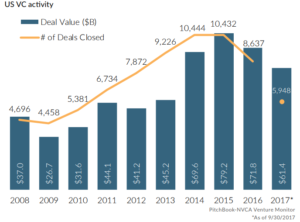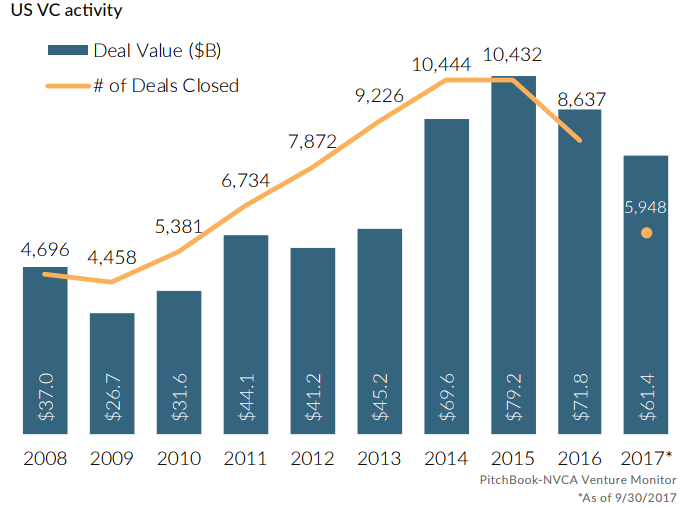U.S. Companies in multiple industries seek private capital to kindle a startup or fuel growth. Most entrepreneurs are aware of venture capital and angel investors as target sources of funds – pop culture shows such as Shark Tank and Dragon’s Den, as well as press-earning “unicorn” valuations – have earned ‘Venture Capital’ a spot in layman’s language. Far less understood is the work of investment bankers – particularly those raising capital in the private market.
This blog, “The Cap Raise”, is a collaboration between Cairn Cross of FreshTracks Capital and Diane Abruzzini of VENTURE.co Holdings, Inc. We intend to discuss the differences between raising funding from venture capital firms and raising funding via broker-dealers. We’ll start with some general definitions.
A Venture Capital firm is most often a Limited Partnership (LP), managed by a team of General Partners (GPs). General Partners first obtain committed capital from accredited investors or qualified purchasers–Limited Partners–and use these commitments to form a fund. Each fund usually has a defined lifespan and specific industry or geographical focus. Typically, General Partners have full investment decision-making discretion over their Limited Partner funds, the funds have a defined life (typically 10 years) and investments in portfolio companies are made during the “investment period”, which is usually the first two or three years of the fund’s life. VC fund returns are reliant upon the sale of the fund’s stake in portfolio companies to private equity firms, strategic acquirers, or occasionally via an Initial Public Offering (IPO).
The number of U.S. Venture Capital deals per annum (post the economic recession of 2008) increased from 4,458 in 2009 to a peak of 10,444 deals in 2014 before slipping to 8,637 deals in 2017. But despite the decrease in the number of VC deals per year from 2014 through 2017, there has been a marked increase in the dollar size of individual deals. This growth, in terms of investment and capital deployment, came alongside a rise of disruptors: technology-enabled companies whose business models cut long-standing, high-profit industries off at the knees.
A broker-dealer is in the business of buying and selling securities on behalf of its customer (as a broker), for its own account (as a dealer), or both. One aspect of a broker-dealer’s business is often the raising of funds for corporate clients in the capital markets–”investment banking.” Broker-dealers are registered with the Financial Industry Regulation Authority (FINRA), and there are currently fewer than 4,000 firms in the United States. Investment Bankers are Registered Representatives associated with a broker-dealer, are also licensed by FINRA, and engage in activities around sourcing, vetting, marketing, syndicating and selling securities.
Any firm raising funds for the private sale of an unregistered (non-traded) security must use a broker-dealer, unless the issuer is seeking exemption from registration as a Self-Issuer. “The issuer exemption was meant to provide a safe harbor for employees or directors of the issuer, so that small businesses could raise money more easily and inexpensively. This safe harbor would allow the issuer to avoid registering as a broker-dealer, as they are acting on behalf of their company, not buying and remarketing the securities of a third party”. In fact, most VC General Partners use the Issuer Exemption or a broker-dealer when they raise funds from their investors. Most, but certainly not all, companies seeking funding directly from VC funds use an Issuer Exemption to do so.
Investment Bankers must pass one or more securities exams that qualify them to engage in certain types of securities transactions. Investment Bankers are also bound to know-your-customer (KYC) standards. They have a responsibility[1] under FINRA Rule 2211 to “have a reasonable basis to believe that a recommended transaction or investment strategy involving a security or securities is suitable for the customer, based on the information obtained through the reasonable diligence of the [firm] or associated person to ascertain the customer’s investment profile.”
At present, venture capital funds and broker-dealers are rarely considered simultaneously for a specific raise, in part because of historical trends. Prior to the JOBS Act of 2012, employing a broker-dealer was largely cost prohibitive for offerings of less than $25 million. Legacy model broker-dealers charge high fees, but only upon success: a business model that works best when applied to large offerings. These “wirehouses” or “bulge bracket firms,” as they are called, were crucial for large offerings to remain compliant and to expand distribution to their representative’s Rolodex of investors.
Post-JOBS Act, securities regulations now enable the investment banking process to move online under the conditions specified by Regulation D, Section 506(c). Like many other industries, technology-enabled disruptors have been able to develop efficient ways to distribute smaller offerings at lower fees than legacy model broker-dealers.
Both venture capital funds and broker-dealer offerings are marketed to institutional investors such as pension funds, Registered Investment Advisers (RIAs), and endowments, as well as high net worth individuals. In many cases, VC funds (as with private equity and hedge funds) work with licensed broker-dealers as “third party capital raise” partners, in order to increase the breadth of their distribution.
This blog, VC or BD, will take a deep dive into a variety of capital raising topics. From corporate structure, to governance, to business stage, to industry, there are many factors entrepreneurs and investors should consider before raising or investing in private equity or debt. To ask a question, request a blog topic, or receive new blog notifications, click on the following link and complete the form at the end of the blog:
Cairn Cross co-founded FreshTracks in 2000, and has worked as Managing Partner of the firm since that time. Notable FreshTracks VC investments include SunCommon, Mamava, and Eating Well. Cairn has helped to build a true Vermont entrepreneurial ecosystem by hosting pitch events, accelerator programs, workshops, and teaching at multiple Vermont universities and colleges.
Diane Abruzzini has built her career as a food and agriculture entrepreneur and business consultant. She was a student of Cairn Cross during her time at UVM’s Sustainable Entrepreneurship MBA program. After completing her degree, she spent time working for FreshTracks partners as an analyst. She currently works in marketing and communications at VENTURE.co Holdings Inc, who’s wholly owned subsidiary VENTURE.co Brokerage Services LLC is a FINRA-licensed broker-dealer.
[1] The extent to “fiduciary duty” for broker-dealers is a legal gray area. Even more controversial is the fiduciary duty of registered representatives with respect to retail investors. See https://verdict.justia.com/2018/03/14/brokers-war-fiduciary-duties

https://pitchbook.com/news/articles/16-charts-that-illustrate-current-us-venture-capital-trends
